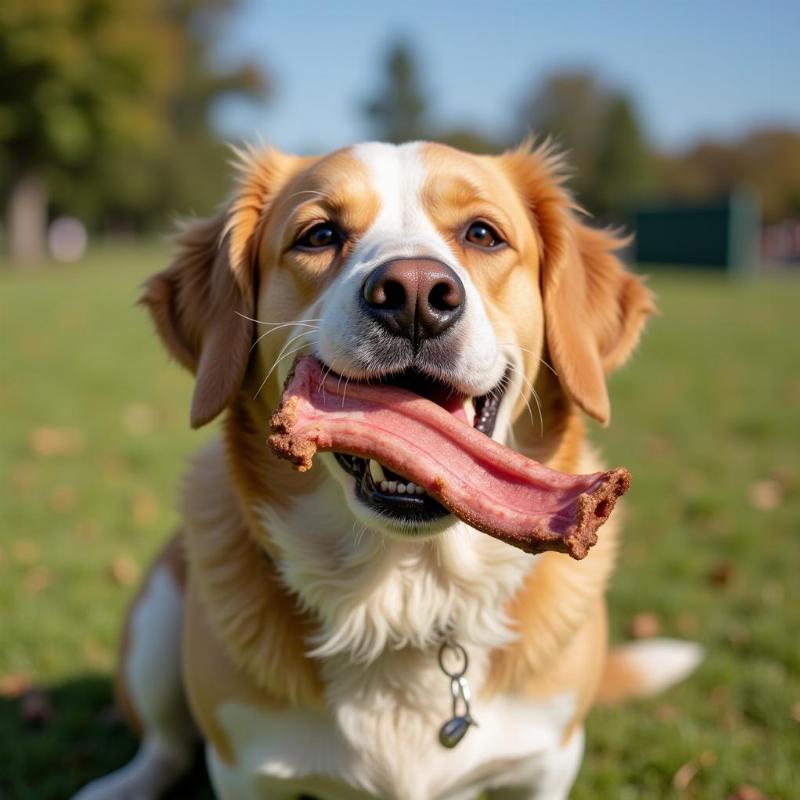Dried pig ears are a popular chew treat for dogs, offering a satisfying gnawing experience. But are they the right choice for your furry friend? This comprehensive guide dives deep into the pros and cons of dried pig ears for dogs, helping you make an informed decision about incorporating them into your dog’s diet. We’ll cover everything from nutritional value and safety concerns to potential benefits and drawbacks, providing you with the knowledge you need to keep your canine companion happy and healthy.
Are Dried Pig Ears Good for Dogs?
Dried pig ears offer several potential benefits. They can be a good source of protein and chondroitin, which may support joint health. The chewing action helps satisfy a dog’s natural instinct to gnaw, reducing boredom and potentially destructive behaviors like chewing on furniture. This chewing also promotes dental health by scraping away plaque and tartar buildup. However, it’s crucial to remember that pig ears are not a substitute for regular dental care.
 Dog Enjoying a Dried Pig Ear
Dog Enjoying a Dried Pig Ear
Potential Risks of Dried Pig Ears for Dogs
While pig ears can offer benefits, they also come with potential risks. Some dogs have sensitive stomachs and may experience digestive upset, including diarrhea or vomiting, after consuming pig ears. Additionally, pig ears are high in fat and calories, which can contribute to weight gain if given in excess. There’s also a risk of contamination with Salmonella or E. coli, which can pose a health risk to both dogs and humans. Always choose pig ears from reputable sources that prioritize safe handling and processing. Finally, some dogs may be allergic to pig ears, so introduce them gradually and monitor your dog for any signs of an allergic reaction, such as itching, swelling, or difficulty breathing.
How to Choose Safe Dried Pig Ears
Selecting safe dried pig ears is crucial for your dog’s health. Look for pig ears that are 100% natural, without added chemicals, preservatives, or artificial flavors. Avoid pig ears that are smoked or heavily processed, as these can contain harmful substances. Opt for pig ears that are a light brown color and have a natural, slightly leathery texture. Avoid pig ears that are excessively dark, greasy, or have a strong odor, as these may indicate poor quality or spoilage.
How Often Should You Give Your Dog a Dried Pig Ear?
Dried pig ears should be given as an occasional treat, not as a regular part of your dog’s diet. Due to their high fat and calorie content, giving too many pig ears can lead to weight gain and other health problems. A good guideline is to offer a pig ear once or twice a week at most, depending on your dog’s size, activity level, and overall diet. Always supervise your dog while they are chewing on a pig ear to prevent choking hazards, especially with smaller dogs or aggressive chewers.
Conclusion
Dried pig ears can be a satisfying and enjoyable chew for dogs, offering benefits like dental health promotion and boredom reduction. However, it’s essential to be aware of the potential risks and choose high-quality pig ears from reputable sources. Moderation is key, and always supervise your dog while they’re enjoying this treat. By following these guidelines, you can help ensure that dried pig ears are a safe and enjoyable addition to your dog’s treat rotation.
FAQ
- Are dried pig ears digestible for dogs? While dogs can digest parts of pig ears, they are not fully digestible. Always supervise your dog and remove any small pieces they might break off.
- Can puppies eat dried pig ears? Puppies generally have more sensitive stomachs. It’s best to wait until they are older and their digestive system is more developed.
- What should I do if my dog gets sick after eating a dried pig ear? Consult your veterinarian immediately.
- Are there any alternatives to dried pig ears? Yes, there are many alternative chews available, such as bully sticks, rawhide alternatives, and dental chews. Consult with your vet to determine the best option for your dog.
- Can dried pig ears help with teething puppies? While the chewing action can be soothing, pig ears are not recommended for puppies due to potential digestive issues. Opt for puppy-specific teething toys instead.
- Where can I buy high-quality dried pig ears? Look for them at reputable pet stores or online retailers that specialize in natural pet products.
- How should I store dried pig ears? Store them in a cool, dry place in a sealed container to maintain freshness and prevent spoilage.
Related Articles on Beautdogs.us
Beautdogs.us is your premier resource for all things dog-related in the US. We offer expert advice on dog breeds, care, and products, empowering both novice and seasoned dog owners. From nutrition and training to health and wellness, Beautdogs.us is your trusted partner in providing the best possible care for your canine companion. Contact us today for personalized guidance! Email: [email protected], Phone: +1 501-555-7529.